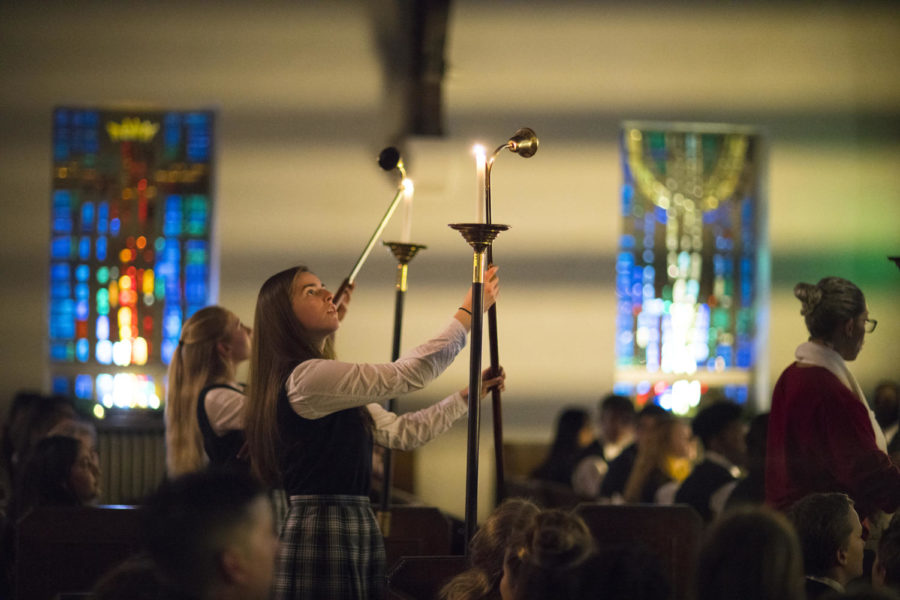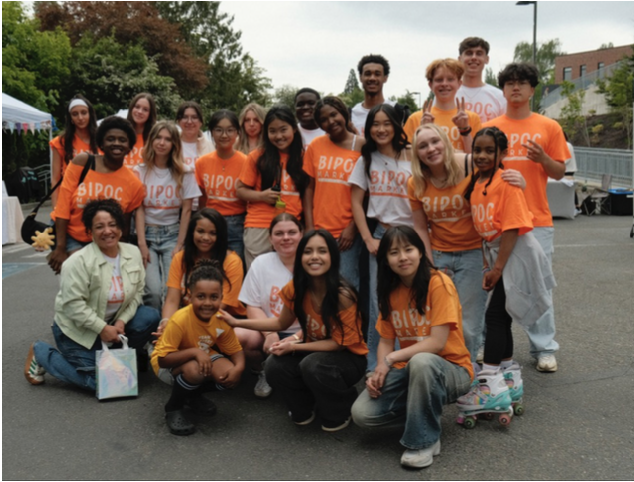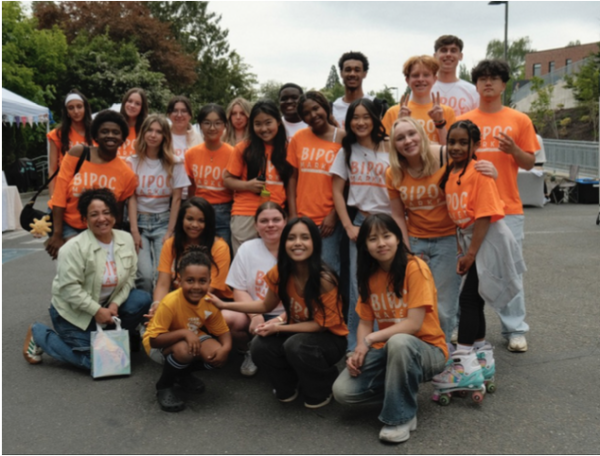The future of chapel at Annie Wright
photo courtesy of Yuhang Wang
November 22, 2019
On October 28, Christian Sullivan, Head of Schools, led a discussion with Upper School students about the future of the Chapel program. He opened by stating that Reverend Megan Mullarkey had left the school. He then opened up the room to suggestions from students.
Opinions varied greatly, with some suggesting Annie Wright make chapel optional and others suggesting that Chapel abandon religion altogether and focus solely on service.
This discussion came six days after Reverend Mullarkey announced that she would be leaving the school. This was a shock to many, as Mullarkey began her career at Annie Wright two months prior. According to Sullivan, “The role of chaplain at Annie Wright is hard to define, and it wasn’t a great fit. I think we both agreed that it was best for her to move on.”
In addition to the conversation in Chapel, Sullivan and other members of the administrative staff sent out a survey that aimed to identify issues most important to students, faculty and staff, including activities that could be considered as part of chapel in the future.
The highest scoring answer was community building. 47% of all responses in the student survey went to this category. It also scored highest in the faculty and staff survey with 84% of all responses, gaining over 140 total votes in both categories.
Religious service? This response lost hard, gaining 7% in the student category, and 7% in the faculty category. Contrary to Annie Wright tradition, of 243 people, only 17 people though that Chapel should be religion-based.
The survey also asked for general comments, which varied widely.
One faculty respondent mentioned discomfort with the Christian overtones: “I felt very uncomfortable with the way chapel happened at the start of the year, even though I was very on-board with the vision for it that both Christian and Rev Megan articulated (exposing students to aspects of world religions, helping them ask the questions of who am I, what do I believe, how shall I live…) — the fact that it was held in a chapel full of crosses, that it began with the singing of a very Christian-hymn-style song, that it was led by a Christian pastor made me uncomfortable both on my own behalf and the behalf of any students who do not identify as Christian.”
Another suggested a reframing: “Let’s stop using the word ‘chapel’ because students at the Upper Schools dislike the sound of it, the term is antiquated and because it will always call to mind ‘religion,’ which is not what people want (while at school) at AWS…Let’s do something else — let’s change the rules.”
Some students had similar responses. “I don’t think chapel should be centered around religious teaching in any way unless it’s students/teachers sharing about their personal beliefs and experiences,” wrote one student. “If the administration wants religion to be a main theme in Monday chapel, it shouldn’t be mandatory.”
Others, however, were concerned about the loss of tradition. “Just because we are school doesn’t mean everything has to be academic,” wrote another student. “It is important to value traditions and our school’s culture.”
Some said they valued the opportunity to see friends in other divisions. “One of the reasons I enjoy chapel is to see all the USG, USB and Middle School students gather together and share their ideas,” wrote another student. “Normally we lack the opportunity to sit together and talk. It’s such a nice time to see all the students in the school.”
“I think everyone is definitely calling for a change,” senior Bailey Black said. “I think in a perfect world for me, chapel would be a really amazing space to approach religion from an academic way. With the mission of the school to be global citizens, we have a responsibility to understand religion, even if it is just academic…but I am not sure how it would continue in a way that would make everyone happy.”
In contrast, junior Eli Connolly, an atheist, had different thoughts. “I mean personally, something like spirituality is not important to me at all,” he said. One thing that I would be interested in would be learning about ways to improve yourself mentally. That doesn’t have to be the focus of it, but something like that.”
Black also mentioned the lack of representation for some faiths. “I think there has been a lot of focus on some major religions,” she said. “I think we have talked a lot about Buddhism, and Judaism, and Christianity, so I think there are some under-represented religions for sure.”
There is some debate about whether or not Annie Wright is still an Episcopalian school. Black, an Episcopalian, responded, “I don’t know, that is a great question. I think that there are episcopal roots that are important to recognize, but saying that we are an Episcopal school says something that I don’t think is necessarily true. Associating it with a particular religion outright might indicate that students should be Episcopalian. I believe that we are more open of a community than that.”
On the same note, Sullivan responded, “The Bishop of the Diocese of Olympia sits on our board (he does not have a vote) and we are a member of the National Association of Episcopal Schools. But I wouldn’t describe us as an Episcopalian school.”
“We continue to have a connection to the Episcopal church,” said Rex Bates, Director of Business Development. I am on the board of the National Association of Episcopal Schools. But there is nothing in that connection that directs the way we run things here, the way that we have Chapel, or the way that Chapel is designed and delivered,” he said.
According to the Chapel page on the Annie Wright website, “Annie Wright Schools no longer practice religion, but do value spiritual and religious life, and support families by providing an ecumenical and interfaith atmosphere in a setting that is, by tradition, Episcopalian.”
Clearly there is a lot to untangle, with no straight answer. The discussion continues.










